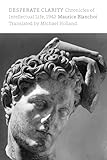Desperate Clarity : Chronicles of Intellectual Life, 1942 / Maurice Blanchot.
Material type: TextPublisher: New York, NY : Fordham University Press, [2021]Copyright date: ©2014Description: 1 online resource (240 p.)Content type:
TextPublisher: New York, NY : Fordham University Press, [2021]Copyright date: ©2014Description: 1 online resource (240 p.)Content type: - 9780823251001
- 9780823291380
- online - DeGruyter
| Item type | Current library | Call number | URL | Status | Notes | Barcode | |
|---|---|---|---|---|---|---|---|
 eBook
eBook
|
Biblioteca "Angelicum" Pont. Univ. S.Tommaso d'Aquino Nuvola online | online - DeGruyter (Browse shelf(Opens below)) | Online access | Not for loan (Accesso limitato) | Accesso per gli utenti autorizzati / Access for authorized users | (dgr)9780823291380 |
Browsing Biblioteca "Angelicum" Pont. Univ. S.Tommaso d'Aquino shelves, Shelving location: Nuvola online Close shelf browser (Hides shelf browser)

|

|

|

|

|

|

|
||
| online - DeGruyter Debates in Continental Philosophy : Conversations with Contemporary Thinkers / | online - DeGruyter Decolonizing Epistemologies : Latina/o Theology and Philosophy / | online - DeGruyter Derrida Vis-à-vis Lacan : Interweaving Deconstruction and Psychoanalysis / | online - DeGruyter Desperate Clarity : Chronicles of Intellectual Life, 1942 / | online - DeGruyter Difficulties of Ethical Life / | online - DeGruyter Divine Enticement : Theological Seductions / | online - DeGruyter Doing Philosophy Personally : Thinking about Metaphysics, Theism, and Antiblack Racism / |
Frontmatter -- Contents -- Introduction -- From the Middle Ages to Symbolism -- A Novel by Colette -- Bergson and Symbolism -- Tales and Stories -- The Politics of Sainte-Beuve -- Stories of Childhood -- Jean Giono’s Destiny -- The Revelation of Dante -- Three Novels -- After Dangerous Liaisons -- The Misfortunes of Duranty -- Realism’s Chances -- Jupiter, Mars, Quirinus -- In the Land of Magic -- Ghost Story -- A User’s Guide to Montherlant -- Considerations on the Hero -- ‘‘The Finest Romantic Book’’ -- That Infernal Affair -- Vigils of the Mind -- Fire, Water, and Dreams -- The Memory of Maupassant -- Unknown Romantics -- Refuges by Léon-Paul Fargue -- Poetic Works -- Bad Thoughts by Paul Valéry -- New Novels -- From Taine to M. de Pesquidoux -- Notes -- Index
restricted access online access with authorization star
http://purl.org/coar/access_right/c_16ec
These articles gradually outline a practical project that both looks back to the radical artistic doctrines of the late nineteenth and early twentieth centuries and anticipates the most original developments in the postwar era, among writers such as Robbe-Grillet, Butor, Sarraute, and Duras, not to mention Blanchot himself. In addition Blanchot is receptive in his weekly column to the extraordinarily wide range of original writing and thinking that was produced during the dark years of occupation, in areas such as psychology, anthropology, ancient history, linguistics, and philosophy. A highly original doctrine of writing can be seen to develop in which, thanks to the desperate clarity with which Blanchot’s mind accepts and advances into what he sees as absolute and irrevocable disaster, thought is carefully and systematically deflected away from any sort of nihilism, thanks to a new relationship between reason, with its unitary subject, and the otherness to which imagination offers access.
Mode of access: Internet via World Wide Web.
In English.
Description based on online resource; title from PDF title page (publisher's Web site, viewed 03. Jan 2023)


